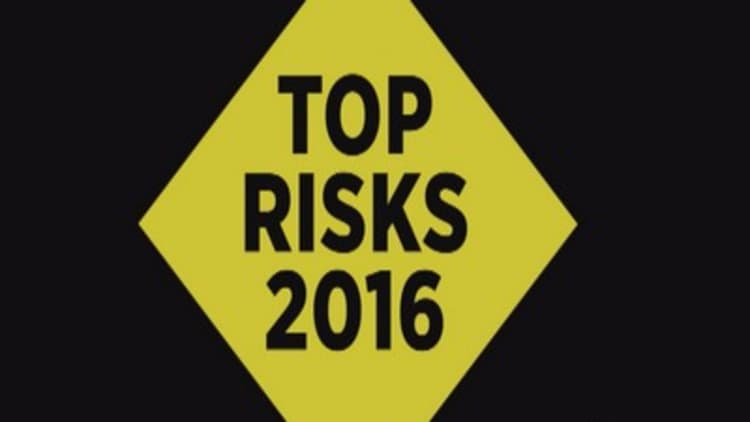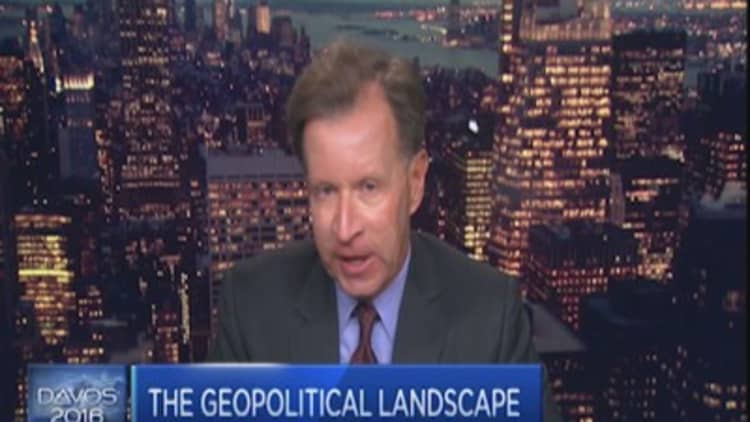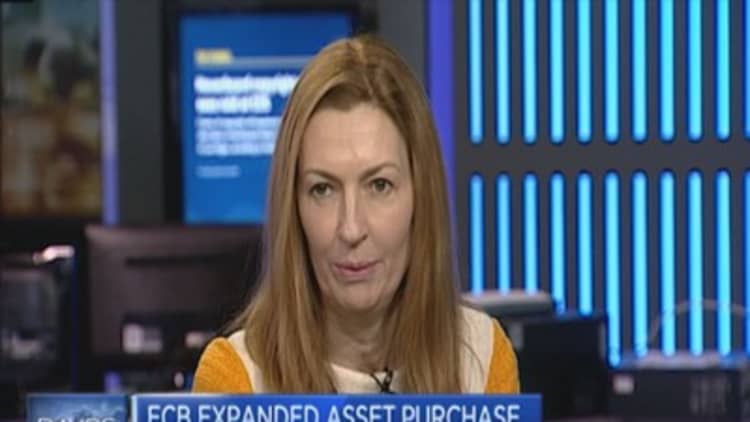
The theme for this year's World Economic Forum (WEF) in Davos, Switzerland, has turned its attention to transformative tech, and "Mastering the Fourth Industrial Revolution."
But while the agenda for leaders of business and politics in the Alpine resort focuses on technology, many conversations are likely to be on the "old" issues still plaguing the world such as the recent market volatility in China to divergent monetary policy, the new oil order, terror risks and geopolitical tensions.
CNBC spoke to some of the key people attending Davos this year to see what the key talking points will be at Davos in 2016.
Hard-landing in China
In the run-up to the start of the WEF on January 20th, all eyes have turned to the east amid a drastic selloff in Chinese equities amid fears that the country might be heading for a "hard landing) and concerns over the Peoples' Bank of China's monetary policy maneuvers.
We are seeing a slowdown in China, (with GDP growth) probably around 6 to 6.5 percent in 2016, but that is still more than double the level we’re seeing in developed markets.Anne Richardschief investment officer at Aberdeen Asset Management
Anne Richards, chief investment officer at Aberdeen Asset Management, said that those concerns could be overdone, however. "We are seeing a slowdown in China, (with GDP growth) probably around 6 to 6.5 percent in 2016, but that is still more than double the level we're seeing in developed markets."
Richards said she was "not yet in the camp that we're seeing a hard landing in China" but the world's second largest economy was certainly set to be a big theme in 2016.
Geopolitics and terror
Last year saw a number of positive developments in geopolitics including a landmark nuclear deal between international powers and Iran, the bringing of the deadly Ebola virus under control, a breakthrough in U.S.-Cuba relations and a global climate deal in Paris.
However, the year was also dominated by several high-profile terrorist attacks on Westerners – mostly at the hands of terrorist group that calls itself "Islamic State" (ISIS) -- and two prominent attacks on European soil, one targeting the satirical magazine Charlie Hebdo and the other a set of coordinated attacks killing 130 people in Paris in November.
In addition to the terror threat, the decline in oil prices and rising tensions between major powerhouses Iran and Saudi Arabia in the Middle East and the future of Europe's fragile political and shaky economic union are also key focal points for 2016.

Reflecting on how a year of geopolitical upheavals could affect the Davos agenda, John Studzinski, vice chairman of Blackstone, told CNBC that the WEF 2016 forum's attention would mark a shift from monetary policy and the economic cycle into "what has become a profound geopolitical cycle."
"The punchline really is that, in Europe, the geopolitical cycle matches or meets the economic cycle because the European Union (EU) with its potential for fragmentation is still one of the largest – if not the largest economic zones in the world -- and that itself will pose a massive challenge for the leadership of the EU," he told CNBC ahead of the WEF summit.
Monetary policy divergence
Last year was dominated by the "will-they-won't-they" uncertainty regarding the timing of a U.S. interest rate hike -- the first in almost a decade. In the end, and after heavy hints to the markets, the U.S. Federal Reserve hiked its key rate by 0.25 percent and the move was taken in the markets' stride.

We’ve had periods of time in the past where when U.S. interest rates and European interest rate policy was apparently going in a different direction and it’s tended not to end too well for Europe, as opposed to the U.S.Anne Richardschief investment officer at Aberdeen Asset Management
While the Fed turned to tightening, in Europe, however, the European Central Bank was loosening the purse strings further in a bid to stimulate growth and ward of deflation. The issue of monetary policy divergence, and its potential impact on the global economy, would be the "big question for 2016," Richards said.
"We've had periods of time in the past where when U.S. interest rates and European interest rate policy was apparently going in a different direction and it's tended not to end too well for Europe, as opposed to the U.S.," she told CNBC.
"But I think that the tail-end of 2015 and the very early part of 2016 with the volatility in markets and the disruption there, if anything, has pushed out the likelihood of further rate rises in the States -- and certainly towards the second half of the year -- which might mean that divergence is less extreme than we thought it might be."
Europe leadership crisis?
The civil war in Syria is now entering its fifth year and despite its distance from the continent, Europe has keenly felt the conflict with over a million refugees, predominantly of Middle Eastern origin, arriving in Europe.
Germany led the charge to open Europe's borders and it is estimated that, in 2015 in total, one million migrants arrived in the country. While Chancellor Angela Merkel drew applause for her leadership of the European response, a spate of sexual assaults on women in Germany on New Year's Eve, allegedly by men of Arab and North African origin, has put her "open-door" policy under fire. The allegations have also played into the hands of right-wing political groups in Europe.
Europe is a bundle of unresolved political crises at the moment, of which probably the most important is migration.Mark Malloch Brownco-chair of the WEF Commission on Business and Sustainable Development
Mark Malloch Brown, co-chair of the WEF Commission on Business and Sustainable Development, told CNBC that geopolitical issues affecting Europe, such as migration, needed more attention and political leaders could use Davos as an opportunity to discuss them.
"Europe is a bundle of unresolved political crises at the moment, of which probably the most important is migration. But it's the political implications of migration, both in Europe and its neighborhood, and the failure to tackle the roots of the mass-movement of people both in the Middle East and Africa – all of that poses a fundamental threat to the whole European ideal."
Blackstone's John Studzinski noted that there was a danger that Europe was threatened as a result or polarization between left and right-wing groups in Europe, a split which has been accentuated by the migrant crisis.
"Europe has got to start listening to itself and try to hold its vision together because it is one of the great success stories of the last 40 years but there is a need for a little more listening and cross-border collaboration. Right now we have the opposite, with people putting up borders because of the refugees and developing local populist and nationalist views and that is the recipe for a lot of trouble."





